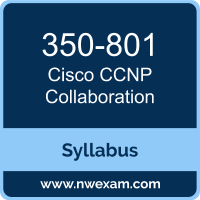 A great way to start the Cisco Certified Specialist Collaboration Core (CLCOR) preparation is to begin by properly appreciating the role that syllabus and study guide play in the Cisco 350-801 certification exam. This study guide is an instrument to get you on the same page with Cisco and understand the nature of the Cisco CCNP Collaboration exam.
A great way to start the Cisco Certified Specialist Collaboration Core (CLCOR) preparation is to begin by properly appreciating the role that syllabus and study guide play in the Cisco 350-801 certification exam. This study guide is an instrument to get you on the same page with Cisco and understand the nature of the Cisco CCNP Collaboration exam.
Our team of experts has composed this Cisco 350-801 exam preparation guide to provide the overview about Implementing Cisco Collaboration Core Technologies exam, study material, sample questions, practice exam and ways to interpret the exam objectives to help you assess your readiness for the Cisco CLCOR exam by identifying prerequisite areas of knowledge. We recommend you to refer the simulation questions and practice test listed in this guide to determine what type of questions will be asked and the level of difficulty that could be tested in the Cisco CCNP Collaboration certification exam.
Cisco 350-801 Exam Overview:
|
Exam Name
|
Implementing Cisco Collaboration Core Technologies |
| Exam Number | 350-801 CLCOR |
| Exam Price | $400 USD |
| Duration | 120 minutes |
| Number of Questions | 90-110 |
| Passing Score | Variable (750-850 / 1000 Approx.) |
| Recommended Training | |
| Exam Registration | PEARSON VUE |
| Sample Questions | Cisco 350-801 Sample Questions |
| Practice Exam | Cisco Certified Specialist Collaboration Core Practice Test |
Cisco 350-801 Exam Topics:
| Section | Weight | Objectives |
|---|---|---|
| Infrastructure and Design | 20% |
1. Describe the Cisco on-premises, hybrid, and cloud collaboration solution design elements described in the SRND/PA
2. Describe the purpose of Edge devices in the Cisco Collaboration architecture such as Expressway and Cisco Unified Border Element
4. Troubleshoot these network components in a Cisco Collaboration solution
5. Explain these components to support Cisco Collaboration solutions
6. Describe Webex Control Hub features |
| Protocols, Codecs, and Endpoints | 20% |
1. Troubleshoot these elements of a SIP conversation
2. Identify the collaboration codecs for a given scenario
4. Troubleshoot SIP endpoints |
| Cisco IOS XE Gateway and Media Resources | 15% |
1. Configure voice gateway elements
2. Troubleshoot dial-peer matching |
| Call Control | 25% |
1. Describe the Cisco UCM digit analysis process 2. Implement toll fraud prevention on Cisco UCM 3. Configure globalized call routing in Cisco UCM
4. Describe Mobile and Remote Access (MRA)
|
| QoS | 10% |
1. Describe problems that can lead to poor voice and video quality
2. Describe the QoS requirements for voice and video
4. Describe the purpose and function of these DiffServ values as it pertains to collaboration
5. Describe QoS trust boundaries and their significance in LAN-based classification and marking |
| Collaboration Applications | 10% |
1. Configure Cisco Unity Connection mailbox and MWI 2. Configure Cisco Unity Connection SIP integration options to call control 3. Describe Cisco Unity Connection call handlers 4. Deploy Webex App Hybrid or Cloud registration |
Cisco CLCOR Exam Description:
Implementing Cisco Collaboration Core Technologies v1.2 (CLCOR 350-801) is a 120-minute exam associated with the CCNP and CCIE Collaboration Certifications. This exam certifies a candidate's knowledge of implementing core collaboration technologies including infrastructure and design, protocols, and endpoints, Cisco IOS XE gateway and media resources, Call Control, QoS, and collaboration applications. The course, Implementing Cisco Collaboration Core Technologies, helps candidates to prepare for this exam.
